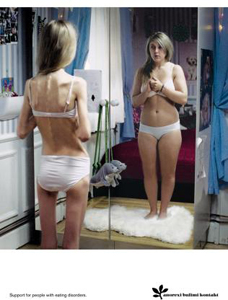 In order to help people better understand eating disorders, here are explanations of anorexia, bulimia, binge eating and orthorexia. If you or someone you know is suffering from any of these symptoms, please contact a therapist or doctor in your area right away.
In order to help people better understand eating disorders, here are explanations of anorexia, bulimia, binge eating and orthorexia. If you or someone you know is suffering from any of these symptoms, please contact a therapist or doctor in your area right away.
Anorexia Nervosa is diagnosed when one refuses to maintain a healthy body weight, experiences an intense fear of gaining weight and a distorted body image, and has not experienced a menstrual cycles for three months in a row (in females). A BMI less than 18.5 in adults generally suggests Anorexia Nervosa. Those with this disorder are often secretive, exercise excessively, drastically restrict their intake of food, and practice other forms of self-harm. Other effects of this disorder include decreased libido, thinning hair, growth of lanugo (delicate down-like hair), consistent feeling of coldness, zinc deficiency, reduced white blood cell count, reduced immunity, sunken eyes, swollen ankles, tooth decay, constipation, dry skin, dry lips, dry hair, poor circulation, headaches, easily bruised, brittle fingernails, fainting, and starvation.
Bulimia Nervosa is diagnosed when one experiences periods of out-of-control eating binges, and purges at least twice weekly and bases self-esteem primarily on body image. Other effects of this disorder include gastric reflux, dehydration, electrolyte imbalance, pancreatitis, peptic ulcers, erosion of teeth, swollen salivary glands, and tearing of the esophagus.
Binge Eating Disorder is diagnosed when one does not exercise control over the amount eating at least twice weekly. These binges are often done when the person is not hungry, and they will eat until they are physically uncomfortable. Binges generally occur when one is alone and leaves the sufferer feeling disgusted depressed or guilty. Binges generally include unhealthy foods and lead to health issues later.
Orthorexia Nervosa is a new disorder characterized by an excessive focus on eating healthy foods. This unhealthy obsession with food is generally about feeling pure more than thin; however, the severe dietary restriction included often results in malnutrition, emaciation, and even starvation.
Eating Disorder Not Otherwise Specified. NOS diagnoses exist for cases where there is a mixed presentation, with symptoms from more than one eating disorder and/or not all criteria are met for a specific diagnosis. Binging every week is still dangerous even if it does not meet the official diagnostic criteria for Binge Eating Disorder.
National Eating Disorders Awareness Week is Feb. 22-28.
